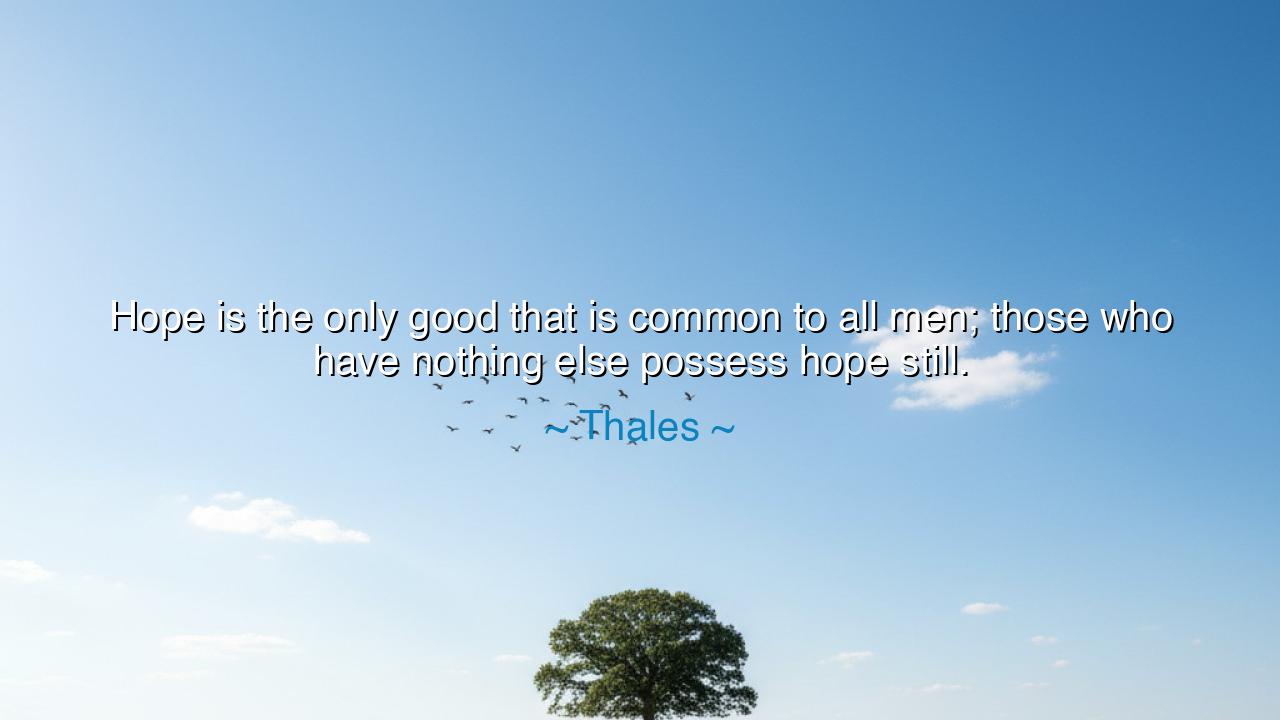
Hope is the only good that is common to all men; those who have
Hope is the only good that is common to all men; those who have nothing else possess hope still.






“Hope is the only good that is common to all men; those who have nothing else possess hope still.” Thus spoke Thales of Miletus, one of the ancient fathers of philosophy, who gazed upon the stars and sought the first principle of all things. Yet in this saying, he does not speak of water or cosmos or numbers — he speaks of the human soul, and of its most enduring flame: hope. This truth, simple and profound, reaches across all ages and nations. For though men differ in wealth, power, or fate, in hope they are equal. It is the one treasure that the beggar and the king share alike, the one light that shines even in the darkest night.
When Thales uttered these words, the world was young, and the Greeks were still learning to think not as tribes, but as men. He saw the storms of fortune that swept through life — the loss of health, of home, of love — and he saw that even when all else was stripped away, something remained. That something was hope — the soul’s quiet defiance against despair. For as long as man breathes, he dreams; and as long as he dreams, he endures. Hope is not wealth, yet it sustains the poor; it is not armor, yet it strengthens the weak; it is not knowledge, yet it gives meaning to all that we learn.
Hope, said the ancients, is the last gift of the gods. In the myth of Pandora, when all the evils of the world escaped from the jar — sickness, greed, war, and sorrow — one spirit lingered within: Elpis, the goddess of Hope. She remained to comfort mankind, to whisper that beyond ruin there might still be dawn. Thus, from the very beginning of the human story, hope has been both our curse and our salvation. For it does not blind us to suffering — rather, it gives us courage to face it, to rise each time we are struck down by the hand of fate.
Consider the story of Viktor Frankl, a man of our own age, who endured the hell of the Nazi concentration camps. Stripped of everything — family, freedom, dignity — he found that the one thing that could not be taken from him was the will to hope. He wrote later that those who could find meaning, even in suffering, were the ones who survived. “Everything can be taken from a man but one thing,” he said, “the last of human freedoms — to choose one’s attitude in any given set of circumstances.” In that choice lies hope — not naïve optimism, but the strength to believe that one’s life still matters, even amid despair. Frankl, like Thales, understood that those who have nothing may yet possess everything, if they hold fast to hope.
Yet let us not mistake hope for idleness. The hope of which Thales speaks is not the weak man’s wish, but the warrior’s faith. It is not waiting for the storm to pass, but walking through it with eyes lifted toward the horizon. The ancients called this endurance, and they knew it was the root of virtue. For what is courage without hope? What is justice, if not the hope that right will prevail? What is love, if not the hope that it will endure beyond time and loss? Hope is not a dream that drifts — it is the pulse of life itself.
In the councils of history, the mightiest empires have risen and fallen, yet hope has never perished. When cities turned to dust and libraries burned, men began again, sowing seeds in the ashes. After the fall of Rome, monks preserved the wisdom of the world by candlelight, believing that learning would one day rise anew. After the wars that scarred nations, children were born who still laughed, still played, still reached for the stars. This is the miracle that Thales foresaw: that hope endures where strength fails, that the human spirit, though wounded a thousand times, forever seeks the light.
So, my child, when the weight of the world bears down upon you, remember these words of the old philosopher. When you lose wealth, remember that gold does not warm the heart. When you lose status, remember that crowns are but dust. And when all seems lost — when the road ahead is shrouded in night — remember that you still carry hope, the eternal companion of mankind. Tend it as you would a sacred flame, for it is the source of all renewal.
For hope is not merely belief in the future; it is the act of choosing life in every moment. Nurture it through kindness, through gratitude, through action. Offer it to others, for in giving hope, you renew your own. And know this — as long as a single spark of hope remains in the heart of one human being, the world itself can never be truly lost.






AAdministratorAdministrator
Welcome, honored guests. Please leave a comment, we will respond soon